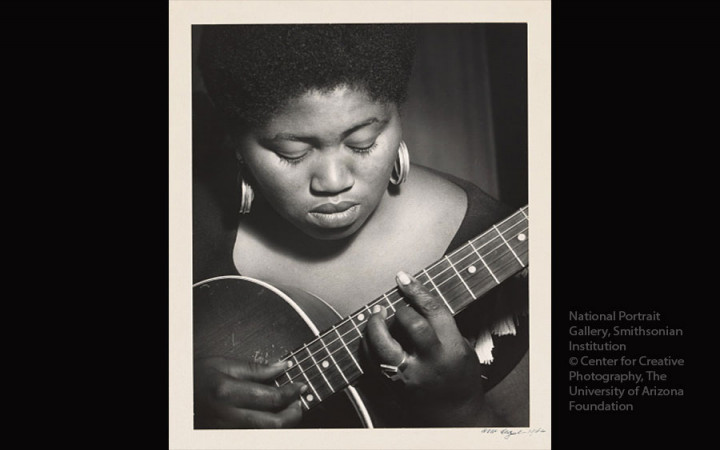Today’s Wonder of the Day was inspired by thomas. thomas Wonders, “civil rights movement” Thanks for WONDERing with us, thomas!
Are there certain songs that you love? Tunes that remind you of a certain person, time, or place? Some people call these special songs “the soundtrack of your life.”
Typically, a soundtrack is a collection of music that goes with a movie or show. However, people also use the word to talk about music that goes along with a certain period in history. Today’s Wonder is about Odetta—a singer who played an important part in the soundtrack for the Civil Rights Movement.
Odetta Holmes was born in Alabama in 1930. It was the end of the Great Depression. She heard the songs workers sang while they labored in the fields. When she was six years old, her family moved to Los Angeles, California. At home, her mother listened to opera on the radio. Her stepfather tuned in to country music from the Grand Ole Opry on Saturday nights.
As she grew older, Odetta studied music. She took piano and voice lessons. Then she went to Los Angeles City College. There she earned a degree in classical music.
Odetta often spoke about how these different experiences with music shaped her. But on a trip to San Francisco after college, she found the music that spoke to her—folk music. Odetta said that folk music taught her about the human spirit. She thought the songs told about loneliness, anger, fear, and sadness.
Odetta began performing folk songs in coffeehouses. She learned to play the guitar. She even started writing some of her own songs. In 1953, Odetta moved to New York City.
In 1956, she released her first solo album, “Odetta Sings Ballads and Blues.” The songs on it included “Muleskinner Blues” and “Jack ‘o Diamonds.” She released a second album, “At the Gate of Horn,” the next year.
Her songs mixed the sounds of spirituals, blues, jazz, and opera music into folk music. She also included bits of recordings that she found in the Library of Congress. People describe these songs as both personal and political.
Her music was the perfect soundtrack for the Civil Rights Movement. Her songs told of protest and resistance. Odetta took part in the march in Selma, Alabama. Then in 1963, Odetta joined Dr. Martin Luther King Jr. in the March on Washington. From the steps of the Lincoln Memorial, she sang “Oh Freedom” and “I’m On My Way” for the crowd of protestors.
Over time, folk music became less popular, but Odetta continued to perform. She did concerts at folk festivals and Carnegie Hall In New York City. In 1993, she received the National Medal of the Arts—the highest art award given in the United States.
Odetta and her music gave voice to the Civil Rights Movement. What other musicians contributed to that soundtrack? What singers are performing protest music today?
Standards: CCRA.R.1, CCRA.R.2, CCRA.R.10, CCRA.L.3, CCRA.L.4, CCRA.L.5, CCRA.L.6, CCRA.SL.2, CCRA.W.3, D2.His.2, NCAS.PR.4, NCAS.CN.10




